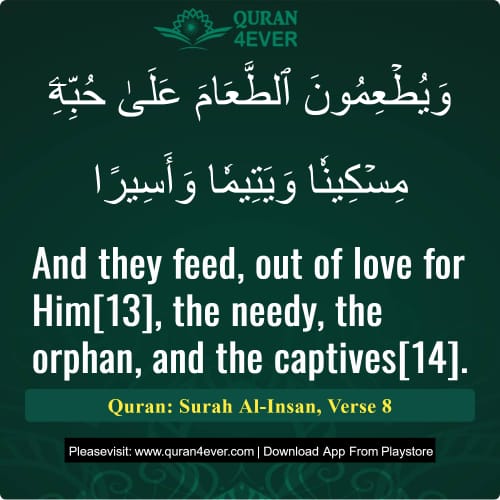
Transliteration:( Wa yut''imoonat ta'aama 'alaa hubbihee miskeenanw wa yateemanw wa aseeraa )
"And they feed, out of love for Him[13], the needy, the orphan, and the captives[14]."
✅ [13] Charity Out of Love for Allah
The verse highlights that the righteous individuals feed others, not out of obligation, but out of love for Allah.
They sacrifice their favorite foods, showing true generosity.
This emphasizes that charity should be given with sincerity and devotion, especially when one is in good health, as charity in times of well-being holds greater virtue.
Even when in need, the pious prioritize the needs of others, demonstrating their selflessness and love for Allah.
✅ [14] The Captives and the Context of Jihad
The mention of captives indicates the verse was revealed in Madinah, where the first Jihad (Holy War) took place, bringing captives with it.
In Islam, there is no concept of life imprisonment for criminals; instead, punishment is linked to justice and reform.
The act of feeding captives illustrates the mercy and compassion shown even to those who might have opposed Islam, as they too are treated with dignity and care.
The tafsir of Surah Al-Insan verse 8 by Ibn Kathir is unavailable here.
Please refer to Surah Insan ayat 4 which provides the complete commentary from verse 4 through 12.
(76:8) those who, for the love of Him,[11] feed the needy, and the orphan, and the captive,[12]
11. Most of the commentators hold the view that the pronoun in hubbi-hi refers to food. Accordingly, they interpret the sentence to mean: “In spite of the food’s being agreeable and tasty and that they need it, they give it away to others.” Ibn Abbas and Mujahid say: They do so because of their fondness for feeding the poor (ala hubb-il-it am); and Fudail bin Iyad and Abu Suleman ad-Darani say: They do so out of love for Allah. In our opinion the sentence in the next Ayat “We feed you only for the sake of Allah” supports the last meaning.
12. The custom in the ancient days was that the prisoners were put in fetters and shackles and taken out daily to go about the streets begging food. Later the Islamic government abolished this custom. In this verse, the captive implies every such person who is in bondage, whether he is an unbeliever, a Muslim, a war prisoner, or imprisoned in consequence of a crime, and whether he is provided food in that state, or made to beg for it. In any case, to feed a helpless person who cannot do anything to earn a living is an act of great virtue.
[1813]- The meaning here may also be "out of love for Him," i.e., Allāh (subḥānahu wa taʿālā).

For a faster and smoother experience,
install our mobile app now.
Related Ayat(Verses)/Topics